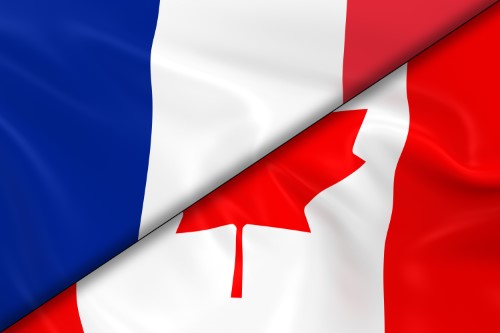 French is the fifth most widely spoken language in the world, with an estimated 274 million speakers scattered across the globe. Variant dialects have emerged from the many diverse countries and continents in which the French language has taken root. But today we will focus on two of the larger dialects that will affect your decision making if you need auto attendant prompts or IVR prompts and need to decide if you need a European or Canadian French recording.
French is the fifth most widely spoken language in the world, with an estimated 274 million speakers scattered across the globe. Variant dialects have emerged from the many diverse countries and continents in which the French language has taken root. But today we will focus on two of the larger dialects that will affect your decision making if you need auto attendant prompts or IVR prompts and need to decide if you need a European or Canadian French recording.
If you are doing business in North America, French should be included in your repertoire of languages covered by your professional voice recordings. Along with numerous French speakers in the United States, French is the official language (along with English) at the federal level, in Canada. In the province of Quebec, French is the only official language, and 95% of Quebec residents speak French as either their first or second language. So if you are expecting to do any kind of business with Canada, it becomes a necessity to have least one recording in French available in your system.
And in Europe, French has proliferated to an even greater degree. French is the third most widely spoken language in Europe, with 20% of the European Union speaking it fluently. It is an official language everywhere from Belgium to Switzerland to Monaco. Also France, but that would seem to go without saying.
European or Canadian French Recording – Which One Do You Need?
So, let’s say you have gauged your company’s needs and have determined that you do indeed have a need to have some voiceover recordings prepared for French-speaking customers, partners, etc. Can you just run your script through translation software and ask the guy in HR who took a few years in French in high school to voice it and offer that as a professional voice message?
No. For starters, as we have often said, it is always best practice to utilize a professional voice talent and a professional translator for your script translation in order to ensure the best possible final product. But even setting aside the matter of sound quality, French is a tricky language that varies wildly depending on where it is spoken.
Canadian French has mutated in very distinct ways from the classic European original. Canada was settled by the French in 16th and 17th centuries, and those settlers were then cut off from the rest of the French-speaking world. As such, the language did not evolve and shift as France and Europe modernized, leaving Canadian French pronunciations and grammar more archaic than the version of the language spoken in Europe. So even if the voice translation for a Canadian and European speaker contained the exact same wording, you would still end up with two extremely different recordings because they would pronounce individual words in ways totally unique from one another.
Messy Translations
But also, the wording would probably not be the same, not if a script has been properly translated to the needs of a specific version. Canadian French may be rooted in a more archaic version than exists in modern France, but it has evolved as well. Canadian French includes more Anglican words and phrases and has also expanded to include words and phrases derived from First Nations people. For example, in European French the word for “sandals” is “les sandales”. In Canada, the same item is referred to as “les babiches”.
And then there are the grammatical differences. Like the other Romance languages, French has both formal and informal forms. Canadian French speakers tend to use the more informal version of the language, whereas European speakers defer to the more formal incarnation.
A native French speaker will most likely be able to decipher your meaning even if you are speaking to them in a dialect different from their own. But “decipher” is probably not a word you want associated with the experience someone will have when listening to your auto attendant prompts or trying to navigate your IVR prompts. Clarity is key.
Whether you need a European or Canadian French recording depends on your location, your clientele, your partners, and a number of other factors unique to your business. So ask yourself the important questions and then engage professionals to help you craft the exact right message for the exact right audience.
